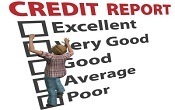Slap your back, treat yourself to a sinful sauna session and scrape all those photo-bombed selfies from your Facebook page.
That fairy-tale job you’ve been pursuing doggedly is now yours. The interview rounds are done and you’ve been asked to submit the necessary paperwork to set the hiring process in motion.
Only, the ‘Welcome aboard’ email never reaches you. Instead, the mail that does reach your inbox is the one where your might-have-been employer lets you know that you aren’t fit to be hired.
“Why?”
If that question doesn’t reverberate in your eardrums, kick yourself.
“I qualified for the position, didn’t I?”
That’s probably the next question assaulting your ears.
“Qualified”? Not according to your might-have-been employer. Remember that one time you defaulted on your credit card payment back in college (yes, college!) and did not think much of it back then?
Well, that one credit payment default has come back to haunt you. Literally. It has dented your prospects, making your potential employer conclude that you are irresponsible, not only financially but also as an individual.
Fact check about credit checks
Credit score check has been an integral part of the hiring process in companies across the world. However, this practice has entered the Indian job sphere only recently.
Mostly carried out for senior leadership positions involving sensitive information and high security risks, companies in the insurance, banking and IT sector have been the first to adopt this as part of their background checks prior to on-boarding.
Credit Information Bureau Limited or CIBIL is India’s first credit information company that collects information pertaining to credit cards and loan payments by individuals.
Two sides of the credit coin
On one hand, a sound credit record is a homing beacon for lenders. It reflects positively on an individual’s ability to handle their finances astutely while maintaining their lifestyle.
However, if you’re guilty of a credit history that’s gone awry, you may unwillingly find yourself in a catch-22 situation. You don’t have the money to settle that nagging missed payment. A paying job would have solved things. Only, you’re not getting a job because of that one missed payment!
In India, organizations are still warming up to the practice of pre-employment credit checks, unlike international organizations where it is par for the course. As a result, an average jobseeker in India stands a greater chance than their Western counterpart of getting a job that he or she wants.
Interestingly, countries like the U.S are now debating whether to scrap this practice in order to level the playing field for struggling job-seekers.
The question for India, however, remains. In a country like ours, where white-collar crimes and financial frauds are rampant, would pre-employment credit checks prove to be helpful if standardized as part of the hiring process? Would they help weed out the chaff or would they end up throwing out the wheat instead?
The coin stays tossed on this one.
What do you think?
